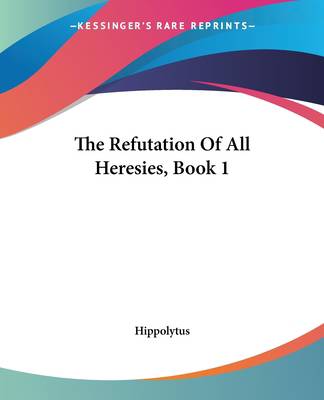
- Afhalen na 1 uur in een winkel met voorraad
- Gratis thuislevering in België vanaf € 30
- Ruim aanbod met 7 miljoen producten
- Afhalen na 1 uur in een winkel met voorraad
- Gratis thuislevering in België vanaf € 30
- Ruim aanbod met 7 miljoen producten
Zoeken
Omschrijving
The Refutation of All Heresies, Book 1 is a comprehensive work by Hippolytus, an early Christian theologian and bishop of Rome in the third century. This book is a detailed examination and refutation of various heretical beliefs and practices that were prevalent in the early Christian Church.Hippolytus begins by outlining the basic tenets of the heresies he will be refuting, including Gnosticism, Marcionism, and Valentinianism. He then proceeds to provide a detailed critique of each of these heresies, using a combination of biblical exegesis, philosophical argumentation, and historical evidence.Throughout the book, Hippolytus emphasizes the importance of adhering to orthodox Christian doctrine and warns against the dangers of deviating from it. He also addresses various practical issues related to the heresies he is refuting, such as the proper way to administer baptism and the use of sacraments.Overall, The Refutation of All Heresies, Book 1 is a valuable resource for scholars and students of early Christian theology, as well as anyone interested in the history of Christian thought and practice.And he admits natures (such as those) of demons, and says that some of them are good, but others worthless. And some affirm that he states the soul to be uncreated and immortal, when he uses the following words, ""Every soul is immortal, for that which is always moved is immortal;"" and when he demonstrates that the soul is self-moved, and capable of originating motion. Others, however, (say that Plato asserted that the soul was) created, but rendered imperishable through the will of God.This scarce antiquarian book is a facsimile reprint of the old original and may contain some imperfections such as library marks and notations. Because we believe this work is culturally important, we have made it available as part of our commitment for protecting, preserving, and promoting the world's literature in affordable, high quality, modern editions, that are true to their original work.
Specificaties
Betrokkenen
- Auteur(s):
- Uitgeverij:
Inhoud
- Aantal bladzijden:
- 48
- Taal:
- Engels
Eigenschappen
- Productcode (EAN):
- 9781419180163
- Verschijningsdatum:
- 17/06/2004
- Uitvoering:
- Paperback
- Formaat:
- Trade paperback (VS)
- Afmetingen:
- 190 mm x 233 mm
- Gewicht:
- 113 g

Alleen bij Standaard Boekhandel
+ 51 punten op je klantenkaart van Standaard Boekhandel
Beoordelingen
We publiceren alleen reviews die voldoen aan de voorwaarden voor reviews. Bekijk onze voorwaarden voor reviews.











